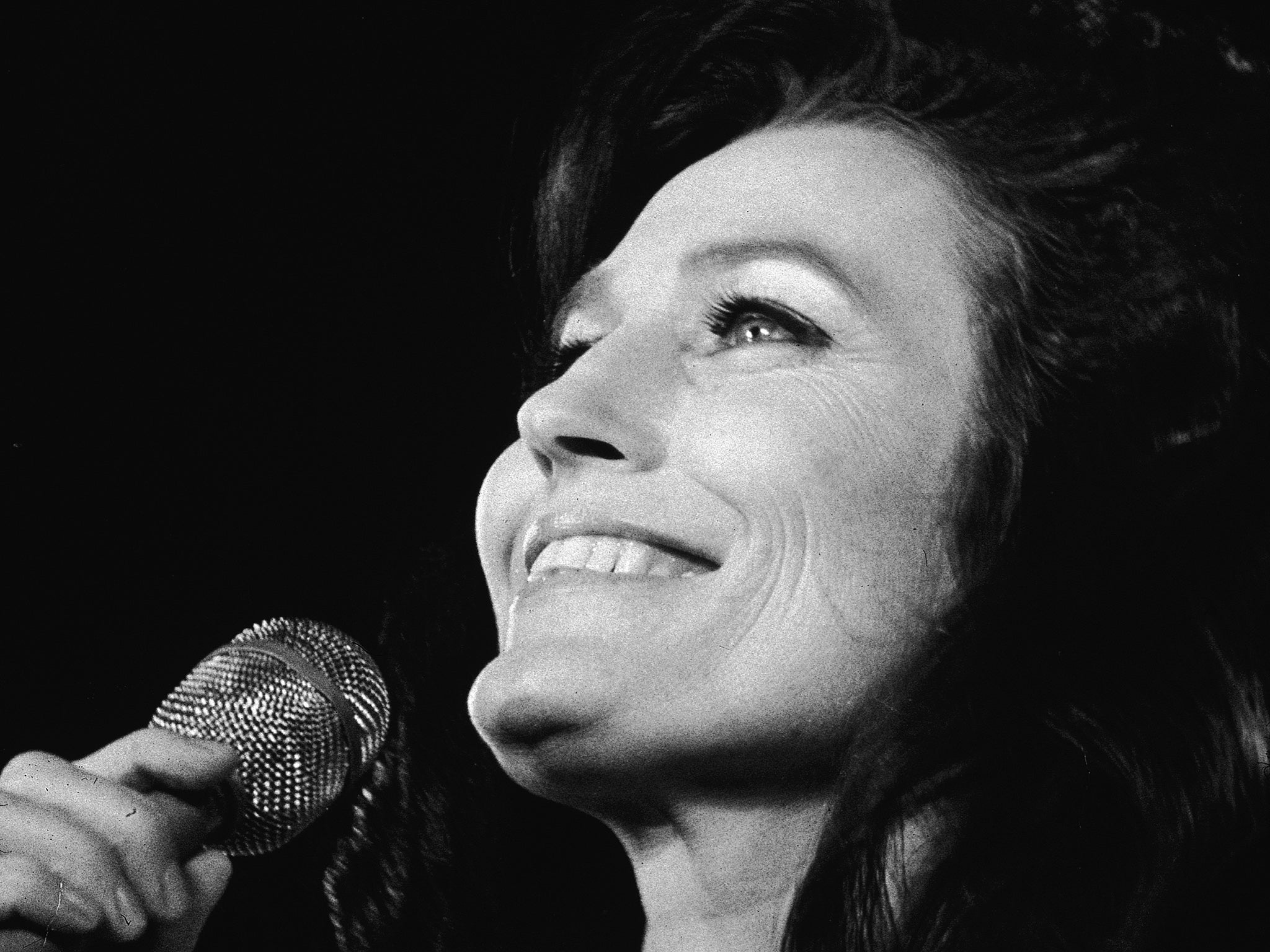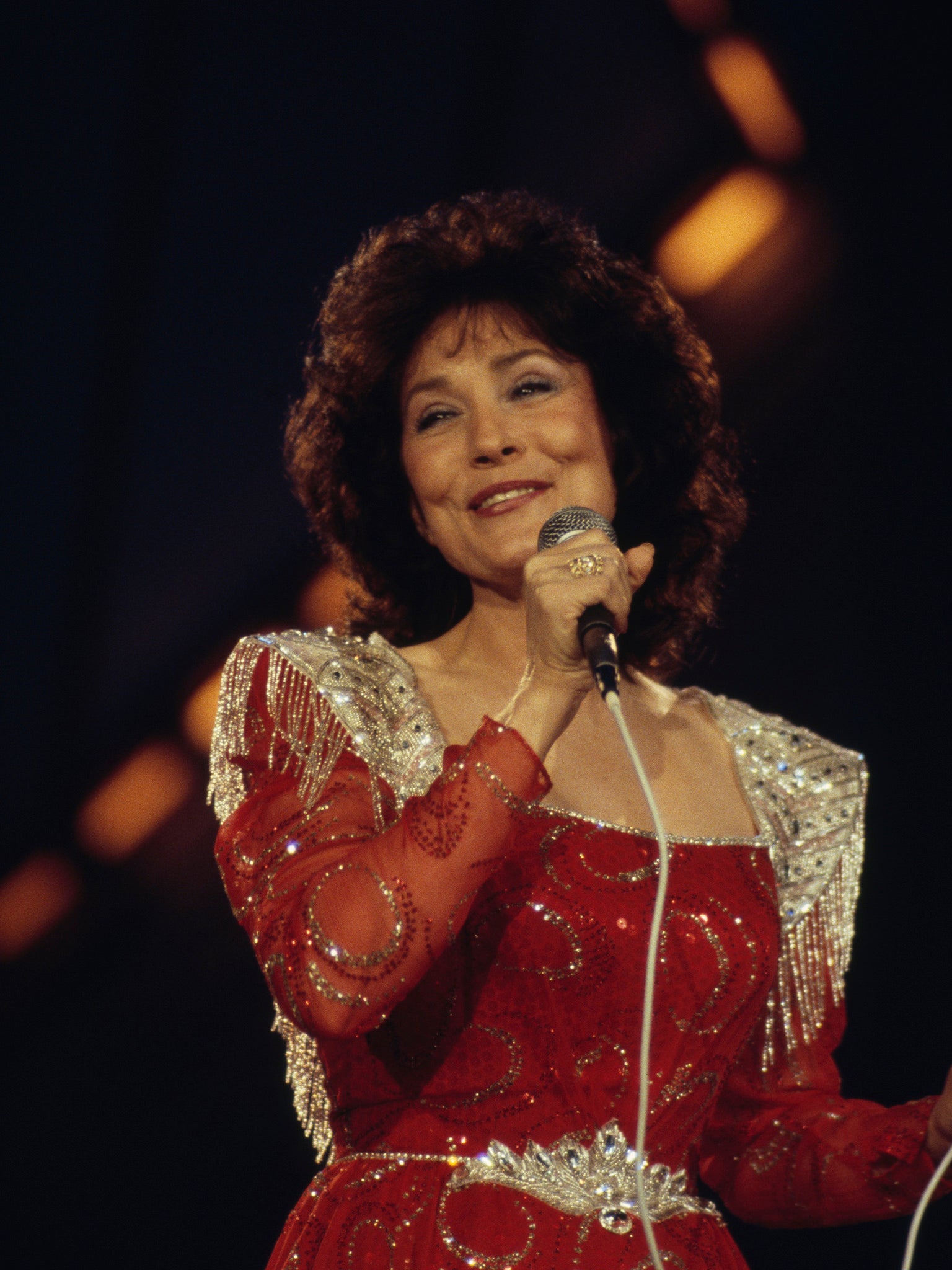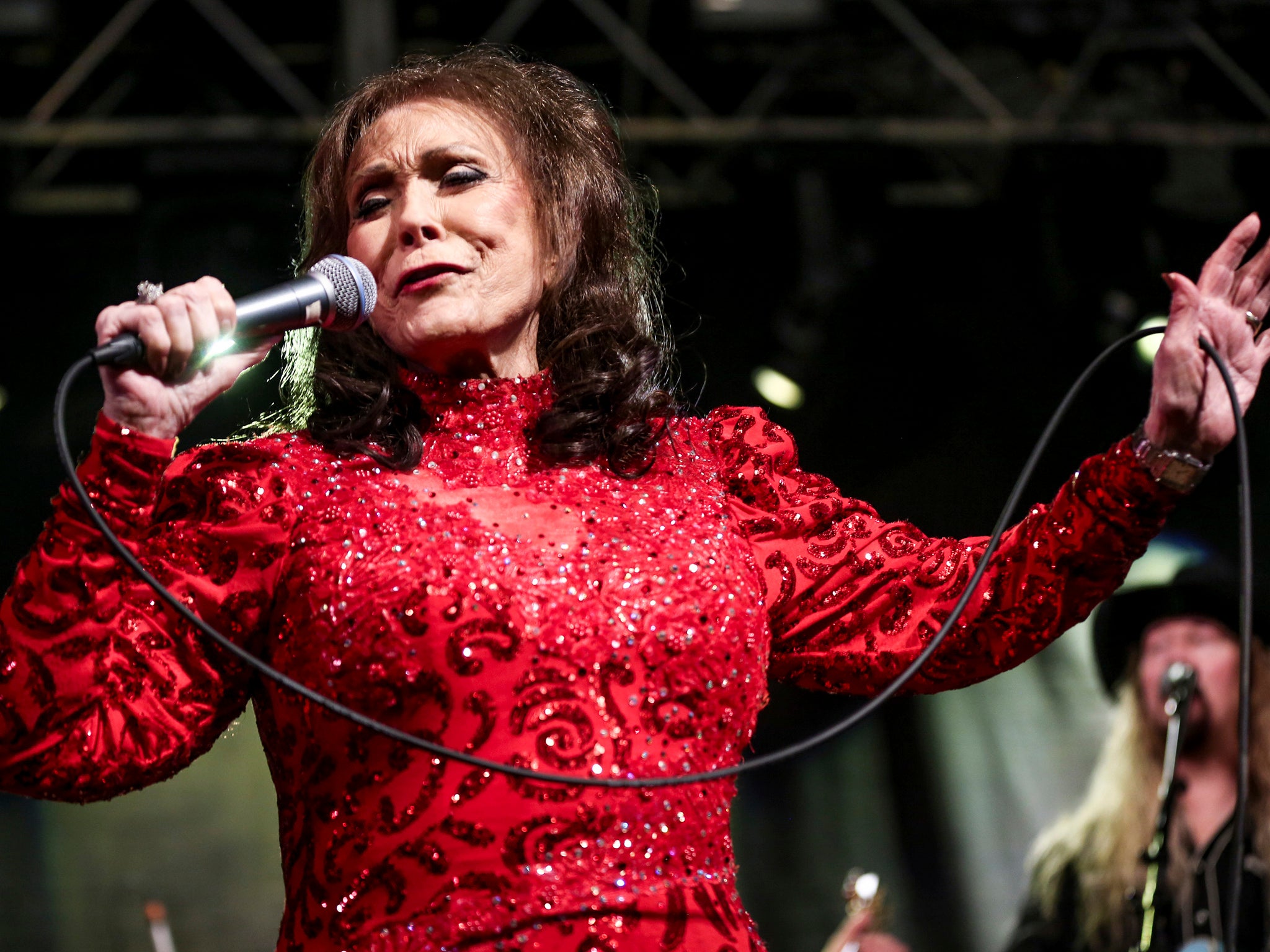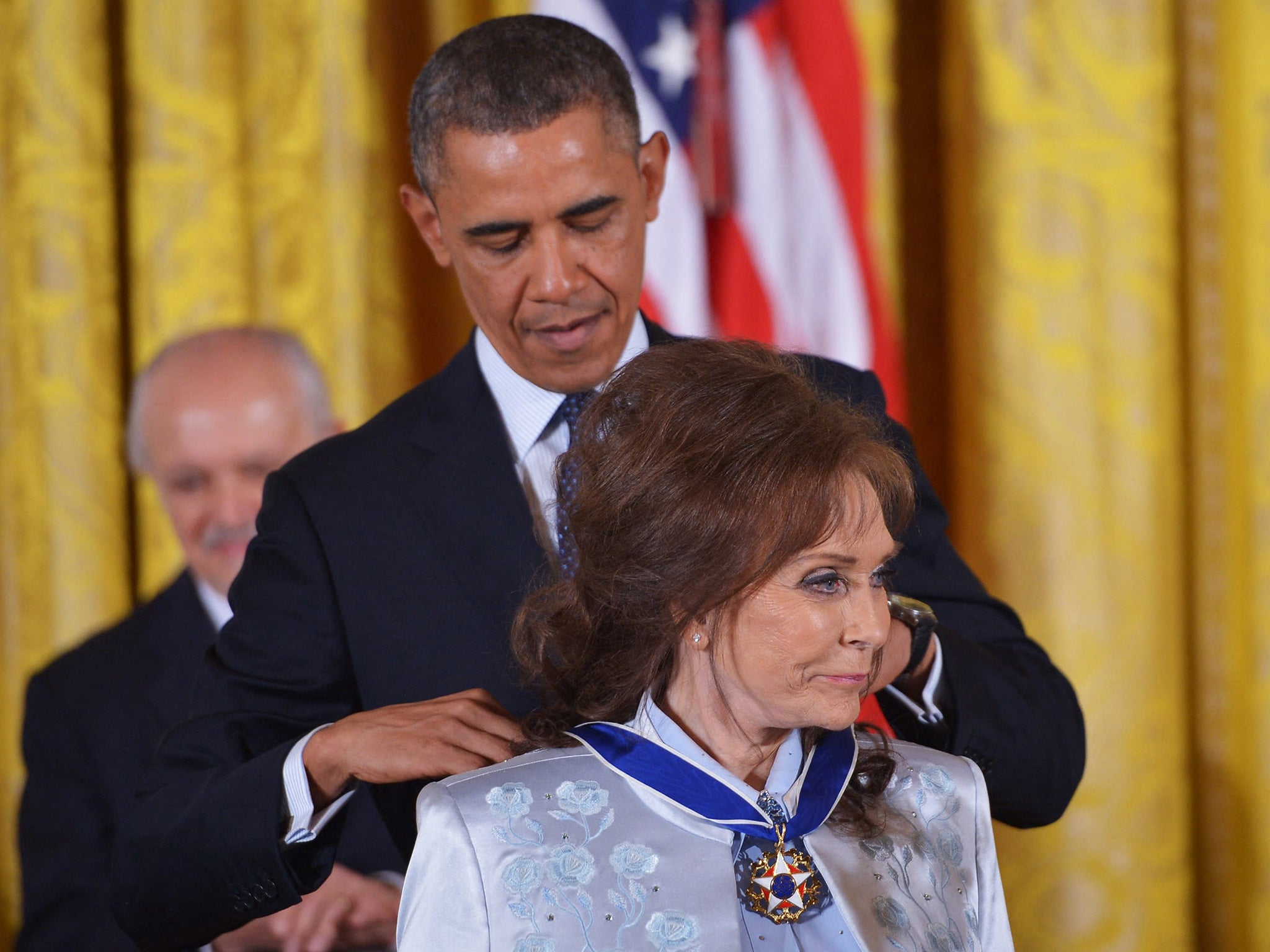Loretta Lynn: Country music royalty who had string of award-winning hits
The musician’s candid songs gave voice to the daily struggles of working-class women

Loretta Lynn, a singer and songwriter whose rise from dire poverty in Kentucky coal country to the pinnacle of country music was chronicled in the best-selling memoir and movie Coal Miner's Daughter, and whose candid songs gave voice to the daily struggles of working-class women, has died aged 90.
Lynn’s career was remarkable for its storybook ascent from hardscrabble origins. She was a teenage bride and mother, a country star and a grandmother by her early thirties. A trailblazer for other female country performers, she was the first woman to win the Country Music Association’s entertainer of the year award, in 1972. She also helped redefine and broaden the appeal of country music.
“She was the groundbreaking female singer-songwriter in country music,” Robert Oermann, co-author of Finding Her Voice, a study of women in country music, told The Washington Post in 2003. “Her songs were delivered from a distinctly female point of view, and that had not been done before, not the way she did it. Writing about women as they really lived – that was a breakthrough.”
In 2013, when Lynn received the Presidential Medal of Freedom, the nation’s highest civilian honour, president Barack Obama called her the “rule-breaking, record-setting queen of country music” who “gave voice to a generation, singing what no one wanted to talk about and saying what no one wanted to think about”.
Her career was propelled by an indisputable musical talent, a strikingly photogenic presence and a formidable grit. “Having to grow up as fast as I did when I got married took something away from me,” she noted in her second memoir, Still Woman Enough (2002). “But it also gave me something: a hard-won strength.”
Many of Lynn's most memorable songs celebrated her Kentucky roots and were rendered in an unmistakable Appalachian twang. Her first album, Loretta Lynn Sings (1963), reached No 2 on the Billboard country album chart, but her greatest success came later, often with tunes packed with personal meaning or topical social themes.
The first of more than a dozen No 1 country hits came in 1967, with “Don't Come Home A-Drinkin’ (With Lovin' on Your Mind)”, written with her sister Peggy Sue about a marriage to an alcoholic.
Some of her other well-known songs included “Dear Uncle Sam” (released in 1966), about a woman saying goodbye to her soldier husband; “Love Is the Foundation” (1973); and “One’s on the Way” (1971), written by humourist Shel Silverstein about a beleaguered housewife expecting a child.
There was also “The Pill”, about the liberating effect of contraceptives on a woman’s life. Lynn recorded the song, by Lorene Allen, Don McHan and TD Bayless, in 1972. Her record company withheld it from release for three years, and many radio stations refused to play it, but it eventually became a Top 5 country hit.

Lynn’s “Coal Miner's Daughter” spent only one week at No 1 after its release in 1970, but it soon became the singer’s signature tune.
After a 1976 memoir, co-written with New York Times journalist George Vecsey, Lynn’s popularity reached its zenith with the 1980 film Coal Miner’s Daughter.
While producers were still casting the movie, Lynn casually announced on The Tonight Show that “little Sissy Spacek” would play her on the screen. Spacek, who shadowed Lynn for months and sang all the movie's songs, won an Academy Award for best actress for her portrayal.
Loretta Webb was born in Butcher Hollow, Kentucky, on 14 April 1932. The hollow, without electricity and indoor plumbing, sat at the bottom of a hill outside of Van Lear, named for the local coal company. Her father, who eventually died of black lung disease, worked in the Van Lear mines.

The second of eight children, Loretta attended a one-room schoolhouse before dropping out of elementary school. She cared for her younger siblings while her mother worked in a nursing home. She didn’t ride in a car until she was 12, and the family’s sole connection to the outside world was a battery-powered radio, which broadcast The Grand Ole Opry.
She married at 15 (not 13, as she claimed in Coal Miner’s Daughter). Her husband, then 21, was a moonshiner who owned the only car in the hollow, an Army Jeep.
A year into their marriage, Lynn – then pregnant with their first child – followed her husband Oliver “Doolittle” Lynn to Custer, Washington. She had four children by the time she was 19 and ultimately was the mother of six.
After hearing her serenade the children around the house, Doolittle bought his wife a $17 guitar and encouraged her to sit in with a local country group. She soon started her own band, Loretta’s Trail Blazers, and won a talent contest hosted by singer Buck Owens in Tacoma, Washington.
Lynn wrote and recorded “Honky Tonk Girl” in 1960, then travelled around the country with her husband, pitching the record to disc jockeys and endearing herself to listeners with her unvarnished charm.
Settling in Nashville in 1961, she landed a slot on a television show of the Wilburn Brothers, who brought her to the attention of Decca Records and renowned country music producer Owen Bradley.

In the early 1960s, Lynn toured as Patsy Cline’s opening act and performed with country star Ernest Tubb.
She formed her most enduring musical partnership with singer Conway Twitty in the 1970s and 1980s. The pair had five No 1 country singles together and won the Country Music Association’s vocal duo of the year from 1972 through to 1975. Their records ranged from the doleful “After the Fire Is Gone” to the upbeat “Louisiana Woman, Mississippi Man” and the melodramatic “As Soon as I Hang Up the Phone”. Twitty died in 1993.
Beginning in the 1960s, Lynn became a television fixture, with appearances spanning such programmes as The Tonight Show, The Muppet Show and The Dean Martin Celebrity Roasts. She discussed her teen marriage and other intimate subjects with a plain-spoken manner that captivated audiences who had never followed country music.
For years, she suffered from migraine headaches that sometimes forced her to miss performances. She was treated for an addiction to sleeping pills in the 1980s.
Lynn won Grammy Awards for “After the Fire Is Gone”, her 1971 duet with Twitty, for a 2004 duet, “Portland, Oregon”, with Jack White of the White Stripes, and for her 2004 album Van Lear Rose. She was inducted into the Country Music Hall of Fame in 1988 and received the Kennedy Centre Honours in 2003 and a lifetime achievement Grammy in 2010.
Three of Lynn's siblings had careers in music. A brother, Jay Lee Webb, who was a singer and played guitar in Lynn's band, died in 1996. Her sister Peggy Sue toured with her band in the 1960s and 70s. Lynn’s youngest sister, Brenda Gail Lynn, who had a successful country and pop career under the stage name Crystal Gayle, won a Grammy for her 1977 hit “Don’t It Make My Brown Eyes Blue”.
Her eldest son, Jack Benny Lynn – named for two of the singer's uncles, not the radio and film comedian – died in 1984 after being thrown from a horse into a river on the family property; Lynn stopped performing for more than a year. She also temporarily retired to nurse her husband before his death in 1996, after 48 years of marriage. A daughter, Betty Sue Lynn, died of emphysema in 2013.
Lynn’s twin daughters, Peggy and Patsy, performed together as the Lynns; a son, Ernest Ray Lynn, played guitar and bass in his mother's band. They survive her, in addition to another daughter, Clara Marie Lynn; 21 grandchildren; and a number of great-grandchildren.
Well into her eighties, Lynn made new recordings and continued to perform. She returned to her Appalachian roots on the largely acoustic album Full Circle (2016), which was nominated for a Grammy for best country album and featured “Lay Me Down”, an autumnal duet with fellow octogenarian Willie Nelson.
“I can probably outwork anyone in Nashville. I ain’t ready to lay down and die,” she told People magazine in 2016. “I don’t see no reason to quit right now.”
Loretta Lynn, musician and singer, born 14 April 1932, 4 October 2022
© The Washington Post

